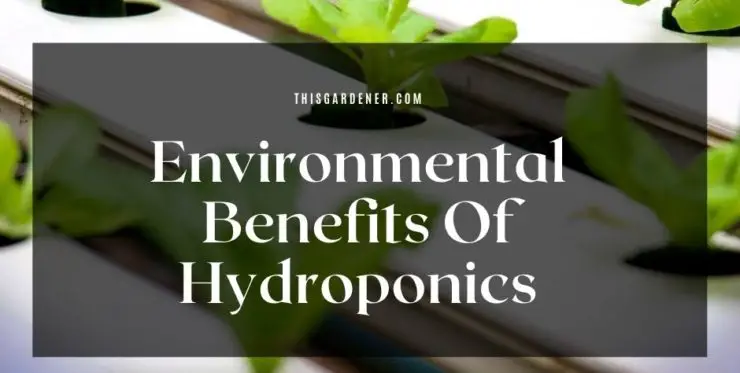Sometimes, you want fresh vegetables but can’t grow them because you don’t have the outdoor space for them. Hydroponics helps to deal with such problems by allowing you to grow your vegetables indoors. With many environmental issues around us, hydroponics might be the best way to grow your vegetables and other plants. If you’re considering what the environmental benefits of hydroponics are, then keep reading to find out.
During the course of this article, you will find out
- What is hydroponics?
- Environmental benefits of hydroponics
Now that we’re clear, let’s dive right in.
Contents
What is Hydroponics?
Hydroponics is basically water gardening; it is a form of gardening without the use of soil. The water used in a hydroponic system provides the plants with all the nutrients they need to thrive. The water feeds the plant’s roots directly so that they don’t have to search the soil for nutrients. Due to this, the plants are allowed to grow fast and also facilitate a bountiful harvest. The hydroponic system provides all the support that a plant needs to make it stand upright. It is also a great way to prevent fungal infection risks which your plants face when grown in the soil.
Environmental Benefits of Hydroponics
When you choose to use the hydroponic system, there are many environmental benefits you get to enjoy. Below are a few of them which you would enjoy on your hydroponic journey.
- It Saves Space: This is one of the best things about hydroponics; we don’t need as much land space as we would need to grow plants traditionally. With a hydroponic system, you can grow your plants indoors with just a little space. This is opposed to the ample space you would require if you choose to plant in the soil. With little space, you can achieve quite a lot with hydroponic systems as opposed to farmlands.
- It Saves Water: Everyone thinks of water when planting as much water is usually needed. This is because plants tend to get dehydrated quickly without sufficient watering. When you water the soil, the water is absorbed by the soil and might sink past the root. This is not a problem you would need to face with hydroponics that doesn’t require soil for plants to thrive. The root is fed with the nutrient-rich water directly, and the pump system ensures that the water circulates appropriately.
- Potentially Better Option than Traditional Farming: This is another benefit of hydroponics. There are many risks to face when you choose the conventional farming method. There are pests and soil erosion that your plants stand at risk for. If you also live in a region with a harsh climate and less fertile soil, you can still grow your plants with hydroponics and be assured of your plants getting all the light, water, and nutrients they need to thrive.
- Less Use of Pesticides: When farming the conventional way, pesticides and herbicides protect the plants from damages caused by weeds and pests. While this might eliminate the unwanted factors, it causes damage to the environment by contaminating the ecosystem. Hydroponic helps you get rid of such issues. There is no fear of weed when you grow with hydroponics, and because the soil isn’t used, there are no pests to be scared of.
- How to Get Potatoes to Sprout Eyes: Detailed Growing Guide with 3 Options - July 31, 2023
- Weight of a Medium Potato: Revealed in Detailed Guide - July 29, 2023
- Maris Piper Potatoes: 9 Substitutes You Should Know About - July 27, 2023
Hello! I’m Jessica Zander, a garden coach and consultant based in the Boston area (zone 6b), offering virtual consultations across the country and Canada.
I’ve been passionate about gardening since the early 1990s, and in 2022, I launched You Can Do It Gardening to empower individuals to feel more confident in their gardening endeavors.
Following a 30-year career in nonprofit finance and operations, I transitioned out of that field in mid-June of 2023 due to the growing demand for coaching services. Interestingly, my years of presenting financial statements to boards and finance committees proved to be valuable experience for teaching people about gardening! I enjoy sharing skills, providing guidance and suggestions, and collaborating efficiently with clients to make significant improvements to their outdoor spaces, both small and large. I also regularly teach at the Arlington Continuing Education and Cambridge Adult Education.
My approach is direct and practical, akin to Mary Poppins, but tailored to your garden. Clients find satisfaction in saving money and taking pride in their own gardening achievements.


Add comment